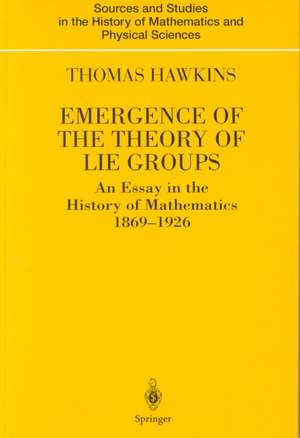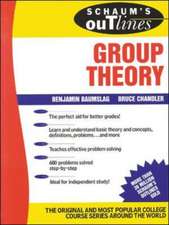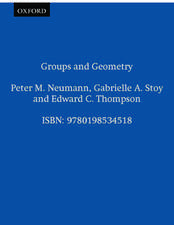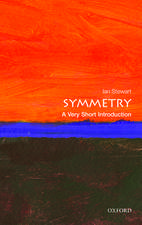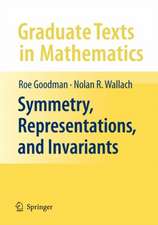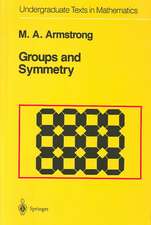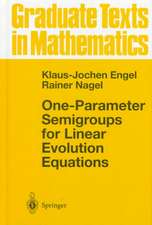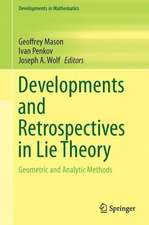Emergence of the Theory of Lie Groups: An Essay in the History of Mathematics 1869–1926: Sources and Studies in the History of Mathematics and Physical Sciences
Autor Thomas Hawkinsen Limba Engleză Hardback – 19 iul 2000
| Toate formatele și edițiile | Preț | Express |
|---|---|---|
| Paperback (1) | 1121.43 lei 6-8 săpt. | |
| Springer – 27 sep 2012 | 1121.43 lei 6-8 săpt. | |
| Hardback (1) | 1124.92 lei 6-8 săpt. | |
| Springer – 19 iul 2000 | 1124.92 lei 6-8 săpt. |
Din seria Sources and Studies in the History of Mathematics and Physical Sciences
- 20%
 Preț: 756.13 lei
Preț: 756.13 lei - 18%
 Preț: 907.11 lei
Preț: 907.11 lei - 15%
 Preț: 667.86 lei
Preț: 667.86 lei - 18%
 Preț: 1434.29 lei
Preț: 1434.29 lei -
 Preț: 387.75 lei
Preț: 387.75 lei - 15%
 Preț: 638.57 lei
Preț: 638.57 lei - 18%
 Preț: 896.70 lei
Preț: 896.70 lei - 15%
 Preț: 643.65 lei
Preț: 643.65 lei - 18%
 Preț: 916.25 lei
Preț: 916.25 lei - 18%
 Preț: 963.29 lei
Preț: 963.29 lei - 15%
 Preț: 652.31 lei
Preț: 652.31 lei - 18%
 Preț: 1244.89 lei
Preț: 1244.89 lei - 23%
 Preț: 686.57 lei
Preț: 686.57 lei - 15%
 Preț: 649.71 lei
Preț: 649.71 lei -
 Preț: 390.25 lei
Preț: 390.25 lei - 15%
 Preț: 644.18 lei
Preț: 644.18 lei - 15%
 Preț: 580.17 lei
Preț: 580.17 lei - 18%
 Preț: 1123.35 lei
Preț: 1123.35 lei - 15%
 Preț: 641.03 lei
Preț: 641.03 lei - 15%
 Preț: 581.14 lei
Preț: 581.14 lei - 18%
 Preț: 796.31 lei
Preț: 796.31 lei - 18%
 Preț: 2119.49 lei
Preț: 2119.49 lei - 24%
 Preț: 860.16 lei
Preț: 860.16 lei - 15%
 Preț: 645.14 lei
Preț: 645.14 lei -
 Preț: 384.48 lei
Preț: 384.48 lei - 18%
 Preț: 1410.63 lei
Preț: 1410.63 lei - 18%
 Preț: 969.28 lei
Preț: 969.28 lei - 15%
 Preț: 642.03 lei
Preț: 642.03 lei - 18%
 Preț: 1113.71 lei
Preț: 1113.71 lei - 15%
 Preț: 662.16 lei
Preț: 662.16 lei - 18%
 Preț: 963.29 lei
Preț: 963.29 lei - 15%
 Preț: 647.59 lei
Preț: 647.59 lei -
 Preț: 395.63 lei
Preț: 395.63 lei - 18%
 Preț: 941.50 lei
Preț: 941.50 lei - 15%
 Preț: 709.56 lei
Preț: 709.56 lei - 18%
 Preț: 901.26 lei
Preț: 901.26 lei - 15%
 Preț: 695.53 lei
Preț: 695.53 lei - 24%
 Preț: 1294.90 lei
Preț: 1294.90 lei
Preț: 1124.92 lei
Preț vechi: 1371.86 lei
-18% Nou
Puncte Express: 1687
Preț estimativ în valută:
215.25€ • 225.34$ • 178.11£
215.25€ • 225.34$ • 178.11£
Carte tipărită la comandă
Livrare economică 05-19 aprilie
Preluare comenzi: 021 569.72.76
Specificații
ISBN-13: 9780387989631
ISBN-10: 0387989633
Pagini: 566
Ilustrații: XIII, 566 p.
Dimensiuni: 155 x 235 x 32 mm
Greutate: 0.91 kg
Ediția:2000
Editura: Springer
Colecția Springer
Seria Sources and Studies in the History of Mathematics and Physical Sciences
Locul publicării:New York, NY, United States
ISBN-10: 0387989633
Pagini: 566
Ilustrații: XIII, 566 p.
Dimensiuni: 155 x 235 x 32 mm
Greutate: 0.91 kg
Ediția:2000
Editura: Springer
Colecția Springer
Seria Sources and Studies in the History of Mathematics and Physical Sciences
Locul publicării:New York, NY, United States
Public țintă
ResearchCuprins
I: Sophus Lie.- 1. The Geometrical Origins of Lie’s Theory.- 2. Jacobi and the Analytical Origins of Lie’s Theory.- 3. Lie’s Theory of Transformation Groups 1874–1893..- II: Wilhelm Killing.- 4. The Background to Killing’s Work on Lie Algebras.- >Chapter 5. Killing and the Structure of Lie Algebrass.- III: Élie Cartan.- 6. The Doctoral Thesis of Élie Cartan.- 7. Lie’s School & Linear Representations.- 8. Cartan’s Trilogy: 1913–14.- IV: Hermann Weyl.- 9. The Göttingen School of Hilbert.- 10. The Berlin Algebraists: Frobenius & Schur.- 11. From Relativity to Representations.- 12. Weyl’s Great Papers of 1925 and 1926.- Afterword. Suggested Further Reading.- References. Published & Unpublished Sources.
Recenzii
"....this study is just as clearly a stunning achievement. Few historians of mathematics have made a serious attempt to cross the bridge joining the nineteenth and twentieth centuries, and those who have made the journey have tended to avert their eyes from the mainstream traffic....the single greatest merit of Hawkins' book is that the author tries to place the reader in the middle of the action, offering a close up look at how mathematics gets made...Hawkins' account of this strange but wonderful saga resurrects a heroic chapter in the history of mathematics. For anyone with a serious interest in the rich background developments that led to modern Lie theory, this book should be browsed, read, savored, and read again."
-Notices of the AMS
-Notices of the AMS
Textul de pe ultima copertă
Written by the recipient of the 1997 MAA Chauvenet Prize for mathematical exposition, this book tells how the theory of Lie groups emerged from a fascinating cross fertilization of many strains of 19th and early 20th century geometry, analysis, mathematical physics, algebra and topology. The reader will meet a host of mathematicians from the period and become acquainted with the major mathematical schools. The first part describes the geometrical and analytical considerations that initiated the theory at the hands of the Norwegian mathematician, Sophus Lie. The main figure in the second part is Weierstrass'student Wilhelm Killing, whose interest in the foundations of non-Euclidean geometry led to his discovery of almost all the central concepts and theorems on the structure and classification of semisimple Lie algebras. The scene then shifts to the Paris mathematical community and Elie Cartans work on the representation of Lie algebras. The final part describes the influential, unifying contributions of Hermann Weyl and their context: Hilberts Göttingen, general relativity and the Frobenius-Schur theory of characters. The book is written with the conviction that mathematical understanding is deepened by familiarity with underlying motivations and the less formal, more intuitive manner of original conception. The human side of the story is evoked through extensive use of correspondence between mathematicians. The book should prove enlightening to a broad range of readers, including prospective students of Lie theory, mathematicians, physicists and historians and philosophers of science.
